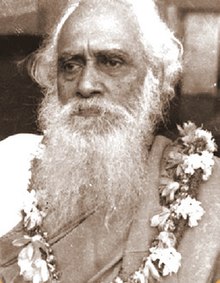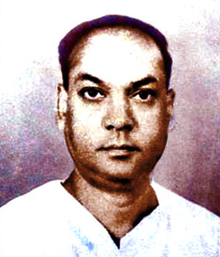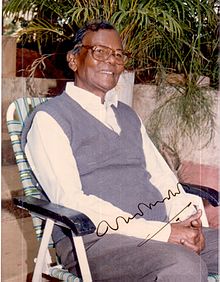
Professor Dr. Attarballabha Mohanty (1887-1963), a renowned Saraswat practitioner, is recognized in the history of Odia literature for his contributions as an educator, administrator, critic, editor and author. After completing his degree in Sanskrit at the University of Calcutta in 1914 he embarked on his career as a lecturer at Ravenshaw College that same year. Following a period in teaching he was appointed as the head professor of the Odia department where he laid a foundation in Odia literature. Professor Mohantys passion for the Odia language and literature led to progress and ended his teaching career in 1947. His remarkable intellect, unmatched guidance and deep appreciation for literature earned him respect throughout the Odia akademi community. In recognition of his achievements he received titles such as Rai Saheb in 1932, Rai Bahadur in 1943 an honorary doctorate from Utkal University in 1955, Vidya Bhushan in 1958 and the prestigious Padma Shri award from the Government of India.
In 1924, he established a literary organization called Prachi Samiti to showcase the works of famous Odia writers from the past and medieval periods. This organization made contributions in this field. He unearthed ancient and medieval Odia literature that had almost faded away from old palm leaf manuscripts and created discussions based on these texts, leading to a fresh perspective in Odia literary analysis. Some of his notable editorial projects included Chintamani,Sarala Mahabharata, Rahasya Manjari, Madalapanji, Bishnugarbha Purana, Brahma Shankoli, Stuti Chintamani, Bata Abakash, Chaitanya Bhagavata, Nirguna Mahatmya, Prem Panchamruta, Rasa Kallola, Rukmini Bibha, Ushabhilasha, Gopibhasha, Mathuramangal, Labanyabati, and Shishirekha, among others. He played a role in the founding of the Odisha Sahitya Akademi and remained involved with the organization throughout his life. Ravenshaw College, Prachi Samiti and the Odisha Sahitya Akademi were all important facets of his intellectual journey.
To acknowledge his impact, on the Odia language and literature the Odisha Sahitya Akademi has been hosting the Attarballabha Mohanty Memorial Lecture series as a tribute to his lasting influence. While there have been disruptions in the events organization it has been an annual occurrence since 1964.

Pandit Nilakantha Das (1884-1967) was a key figure in the Satyawadi Panchasakha movement. Following Utkal Gourav Madhusudan Das and Pandit Gopabandhu he played a role in shaping the formation of Odisha. As the head teacher at Satyawadi Banabidyalaya he was instrumental in advancing education and social causes in the state. His talents extended to areas such as literature, politics and journalism. His contributions enriched Odia literature, with poetry, autobiographies, children's books, historical works and philosophical writings.
He had the honor of being the president of the Odisha Sahitya Akademi. While serving in the Odisha Legislative Assembly he showcased independent thinking and a commitment to effecting change without succumbing to prevailing trends. He approached challenges with logic and fearlessness. He regularly penned articles for Nababharat and Satyawadi journals and demonstrated his skills as the editor of the weekly Samaja. Besides his proficiency in Odia, he was well versed in English and Sanskrit. This proud representative of the Odia community will always shine as our beacon. In 1964, he received the Kendriya Sahitya Akademi Award for his work "Amijeevani."
To honor Pandit Nilakantha Das's contributions the Odisha Sahitya Akademi decided to establish a Memorial Lecture Series on August 28, 1989. This was done as a tribute to him and to preserve his cherished memory. However the program had not been held for a while due to reasons. As a result during a meeting on April 18, 1995 the Akademi executive committee resolved to restart the Pandit Neelkanth Das Memorial Lecture Series. They appointed Professor Benimadhav Padhi to deliver the inaugural lecture. Since then the Akademi has been hosting this lecture series, every year. Numerous esteemed authors from our literary community have participated in this event by giving lectures to honor Pandit Nilakantha Das.

Kabi Sachhi Rautaray (May 13 1916 August 21 2004) is widely acknowledged as a pioneer in modern Odia literature. His poetry is characterized by its clarity and he has openly criticized imperialism, fascism and war through his written works. Rautarays influence extends beyond the realm of literature earning him recognition on a global scale. Throughout his career spanning over seventy years he has made contributions to poetry, short stories, novels, critiques and essays leaving an indelible mark in each genre that will stand the test of time. In honor of his accomplishments he was awarded the esteemed Jnanpith Award in 1986. Rautarays literary journey began at age 15 when his poem was published in the magazine Panchayat in 1928. He actively opposed British rule leading to his expulsion from Khordha University. While studying at Ravenshaw College in Cuttack he faced similar consequences due to his involvement in activities.
During this time, the British government banned his writings and imprisoned him for violating press laws. Despite the pressure from authorities he remained committed to his creativity consistently writing poetry that celebrated humanity. He famously stated "What lasts is life. What fades away is not." In 1962 he received the Padma Shri award for his poetry and also the Central Sahitya Akademi Award that same year. In 1963 various universities conferred upon him the honorary D.Litt degree. He was a prominent figure in Khordha residing in Cuttack where he actively engaged in pursuits. His village, Mashani bid him a farewell. Some of his notable works include Mashani Phool, Chitragriva, Sagara Talara Dheu, Hatara Kahani, Raja Pua, Bhanumatis Dash, Pallishree, Bajiraut, Pandulipi and Kavita 1962. The poem "Chhota Mora Ganti" garnered him recognition setting him apart from other poets. He had a connection with the Odisha Sahitya Akademi serving as its president from July 19, 1978, to August 25, 1981 and fulfilling his literary responsibilities.

Gopinath Mohanty (1914-1991), a celebrated novelist awarded the Jnanpith Award for Odia literature is recognized as a trailblazer in prose writing. He played a role in establishing the Odisha Sahitya Akademi. To honor Gopinaths legacy the Akademi has initiated the Gopinath Mohanty Memorial Lecture program, as a way to express gratitude from the Odia community and preserve his memory. This prestigious event, held annually in Bhubaneswar on April 20 has been organized by Gopinath International since 1992, coinciding with the anniversary of Gopinaths passing.
Gopinath Mohanty (1914-1991), a celebrated novelist who received the Jnanpith Award for Odia literature is recognized as a trailblazer in writing and played a role in founding the Odisha Sahitya Akademi. To honor Gopinaths legacy the Akademi has established the Gopinath Mohanty Memorial Lecture program as a way to express gratitude from the Odia community and preserve his memory. This esteemed event, held annually in Bhubaneswar on April 20 has been organized by Gopinath International since 1992 to commemorate Gopinaths passing. From 1992 to 2011 the Gopinath Memorial Lecture series took place, in Bhubaneswar with notable scholars from around the world sharing their lectures. Looking ahead the Odisha Sahitya Akademi, in partnership with Gopinath International intends to continue this lecture series honoring Gopinaths contributions. Gopinath Mohanty was born on April 20, 1914, in Nagabali village, Cuttack district. He completed his education at Ravenshaw College and pursued advanced studies in English. In 1938 he joined the Odisha Administrative Service. While working in administration he had a passion for literature. He immersed himself in understanding the lives, customs and traditions of communities which he observed closely. His writings inspired by culture gained him recognition as a celebrated literary figure both in India and abroad.
In 1955 he gained acclaim for his novel "Amritarasasanta," which won the Sahitya Akademi Award for Odia literature. Additionally he received the Jnanpith Award in Odia in 1974 for his notable work "Mati Matala." Furthermore his translation of the renowned novel "University" by Maxim Gorky into Odia earned him the prestigious "Soviet Land Nehru Award" in 1970. In recognition of an esteemed literary personality the Odisha Sahitya Akademi has been hosting the Gopinath Memorial Lecture in Bhubaneswar every year on April 20 since 1992. Below is a compilation of notable writers who have presented this lecture from 1992 to 2022.